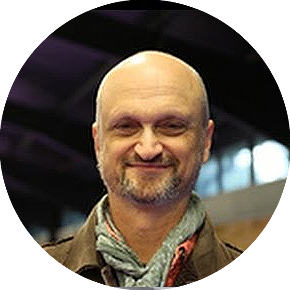Robin Grille Speaks At UNICEF's Baby-Friendly Initiative Conference

 Robin Grille, Kindred's Australian Contributing Editor and author of Parenting for a Peaceful World and Heart to Heart Parenting, speaks at UNICEF's Baby-Friendly Initiative in the United Kingdom in December 2015.
Robin Grille, Kindred's Australian Contributing Editor and author of Parenting for a Peaceful World and Heart to Heart Parenting, speaks at UNICEF's Baby-Friendly Initiative in the United Kingdom in December 2015.
From The Baby-Friendly Initiatie's Website:
At our 2015 conference, psychologist and parent educator Robin Grille gave his talk on Neuro-social evolution: how connectedness was lost, how to reclaim it and what it means for humanity's future. This talk is available to view in full, with slides, below.
In this talk, Robin joins neuropsychology, epigenetics, psycho-history and anthropology to illustrate how and why many of the world's cultures lost, over centuries, the capacity for healthy attachment and/or healthy individuation in childhood. Now that so much is known about the centrality of infant attachment for healthy human function, there is a social and global imperative to ease back towards a healthy attachment society. The implications are bigger than you think.
A few questions arose from Robin's talk, which he has answered below:
What about people who argue against responding consistently to babies' needs, saying: "I'm bringing my child up in a 'competitive, violent world', which they need to be able to thrive in. Otherwise they're just going to be crushed by bullies"
Should one really consider denying a baby healthy attachment in the hope to prepare them for what we perceive to be a hard, denying world? Please distinguish between a baby and an older child! There are plenty of demands on older children, which prepare them for a demanding world. But placing demands on a baby is misguided and potentially harmful. It is not for a baby to be trained for a "tough world". In fact, trauma research clearly shows that adults are far more resilient when they have had all their early-life dependency needs met. So, the best way to prepare a baby for a "tough world, is to always say "yes" to a baby's needs. That is what distinguishes a baby from an older child.
Many parents, prior to having their own baby, come from a career-focused background, with no previous experience of children. It could be argued that this encourages them to gravitate towards strict routines for babies as a method of upbringing. How can I counter this with evidence to show that a more responsive style of parenting will actually be better for their children?
There is good empirical evidence that modern sleep-training techniques unnecessarily stress babies, and we should be concerned about possible long-term effects. Babies who "fall asleep" after controlled-crying or sleep training show elevated cortisol levels. Their "sleep" is not peaceful: Bruce Perry refers to the baby's collapse as the "defeat response".
Virtue Baby Teaser
Healthy attachment is the core foundation of neuro-psychological and immunological health for the life-span. Healthy attachment (for babies) is about responding to the baby's cues – not about systematically delaying or denying the response. Controlled-crying, controlled-comforting or similar sleep-training methods may in some cases quieten the house – at the expense of the baby. In the medium to long term, this does not help the parents.
The Australian Association for Infant Mental Health has expressed strong concern about these practices in their Position Statement #1 on controlled-crying.
Further references Middlemiss W, Granger DA, Goldberg WA, Nathans L. 'Asynchrony of mother-infant hypothalamic-pituitary-adrenal axis activity following extinction of infant crying responses induced during the transition to sleep'. Early Human Development 2012 Apr;88(4):227-32
Lewis M and Ramsay D. 'Infant Emotional and Cortisol Responses to Goal Blockage'. Child Development (2005) Volume 76(2) PP 518-53
 Dear Kindred Readers
Dear Kindred Readers
Here are some things outside the dry bio you should know about me…
Normally, when in dialogue with the public I introduce myself as a psychologist, parent-educator and author of two parenting books. That's the 'business-card' approach – and it sounds very adult.
Now for the real story: I started life as a child, a baby in fact. Deeper: I started life in my Mum's womb (at the latest). That's more relevant than most people realize; because to some extent that is still who I am, why I do what I do and say what I say. I have so many joyous memories of early life, and these nourish and sustain me. However, like many of us today acknowledge, though my family loved me they also f*@#&d me up. There was death, there was migration, there was shattering conflict and upheaval. Wounded people trying to live together in a violent world. Fast forward: I spent many years deep in therapy, primarily group therapy, with a smattering of yoga, meditation and bioenergetics, and these continue to be a commitment and passion.
I believe in our collective humanity, our ability to commune, heal and re-create. My work as a psychologist, a father, a writer and speaker springs from and reflects this commitment.
While the Parenting for a Peaceful World book is used as curriculum by many organizations and parenting education programs, I also continue to write articles for parents and for people who work with children. Many have been translated and republished around the world and are easily found on the net. And two books (so far): Parenting for a Peaceful World and Heart to Heart Parenting. If you are curious about my work, or how to engage me to speak at your organization's conference.
I enjoyed meeting my American readers on the Parenting for a Peaceful World Tour in 2013: drumming in Charlottesville, VA; presenting bi-lingual workshops in Los Angeles; celebrating at the Museum of Motherhood in New York City; and spending an intimate weekend in a 300 year old church in the revolutionary village of Yorktown, VA.
In Peace,
Robin Grille

